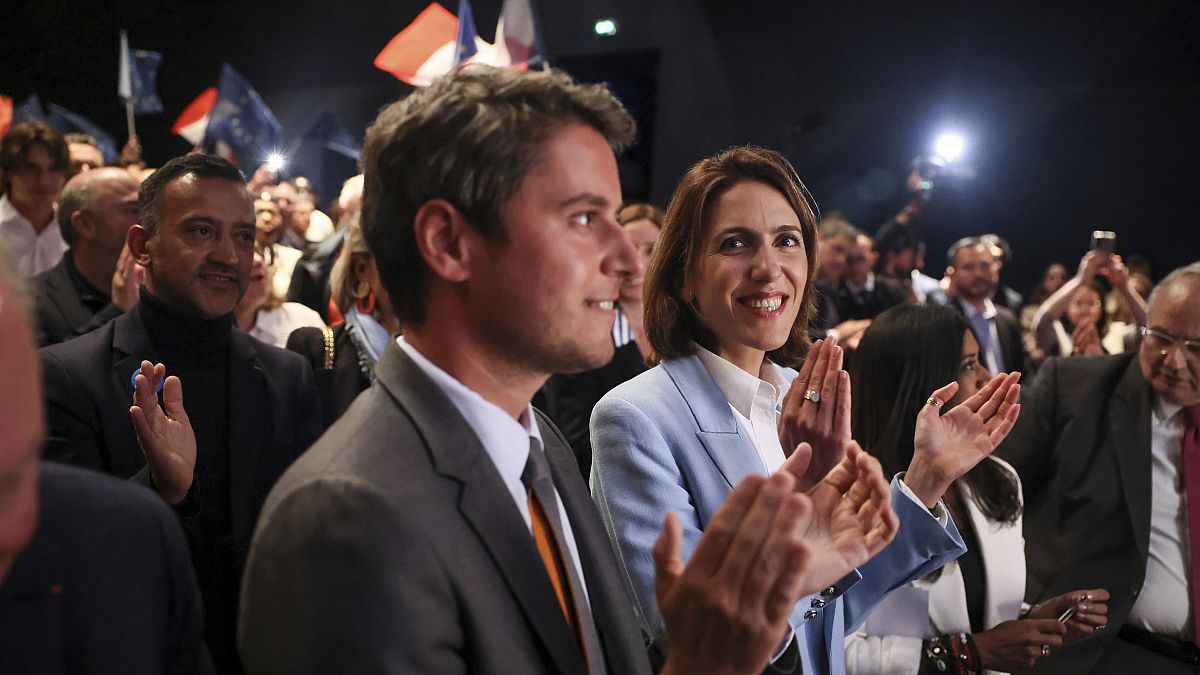Euronews pollsters predict a potential loss of up to 20 MEPs for the EU liberal-democrats group Renew Europe, reflecting a decline in popularity at the national level, especially in France, Germany and the Netherlands.
According to the Euronews Super Polls, which uses publicly released polls to forecast the European Parliament vote on 6-9 June, the continent’s liberals are set to suffer a historic defeat, with their number of MEPs expected to drop from 102 to 82.
Polls suggest the liberal Renew Europe group is set to lose most of its MEPs in France, Germany and the Netherlands.
If the loss is confirmed by the final European elections vote, it could result in significant changes in the next EU legislature.
“Renew’s struggles reflect many of the issues it has faced in national level votes over the past year-plus,” said Boyd Wagner, chief analyst at the Euronews Polls Centre.
“With a range of issues top of mind for European voters, including purchasing power, migration, energy and farmers protests, Renew member-parties have largely failed to address the domestic-level issues favoured by many voters in Europe’s western flanks, where Renew was strongest in 2019,” he explained.
The liberal-democrats’ policies have clashed with the growing sense of insecurity among citizens in the western flank of the EU.
“There is a general trend that liberal democracy is under threat, and that might affect mostly liberal parties. But there are also some specific reasons, and France is a very interesting case,” Steven Van Hecke, Comparative and EU Politics professor at the Public Governance Institute of the University of Leuven, told Euronews.
“In 2019, a lot of French liberals were elected in the European Parliament, after the election victory of Emmanuel Macron two years earlier, in the national elections of 2017,” Van Hecke added.
France is the second largest country in the EU, represented by 79 MEPs in the current 705-seat European Parliament, elected in 2019. Of these, 23 MEPs belong to the “Renew Europe” group, which holds a total of 102 “yellow” seats.
This is particularly relevant as the next European Parliament is set to have a total of 720 MEPs due to a new seat distribution.
According to the Euronews Polls Centre, Renew Europe MEPs from France’s Renaissance party could drop down to an estimated 15 members in the European Parliament.
The next European Parliament could become the stage for numerous political showdowns, pitting liberal democratic and liberal-socialist values against conservative principles.
In this ideological “Squid Game”, France is set to play a relevant role for at least three reasons.
Firstly, France’s importance within the EU and the eurozone cannot be overstated. Secondly, there is the leadership of President Emmanuel Macron, who advanced the values that shaped the Renew Europe group. And thirdly, the French radical right is projected to win the EU elections in France, surpassing Renaissance by nearly double the votes.
Macron’s popularity at home has been on the decline since at least 2019. The French voters rejected the economic reforms implemented by the presidential majority.
Measures including decarbonisation policies, pension reforms, planned reductions in unemployment benefits, and what the far right criticises as an “ineffective anti-migration policy” have all contributed to the president’s negative impact on popularity.
As is often the case, people in Western Europe use the EU elections as a platform to voice their discontent with their national governments.
Similarly, the Dutch liberal-conservatives led by former PM Mark Rutte face a similar situation. The VVD, or People’s Party for Freedom and Democracy, is the second-largest force within the Renew group in the current European Parliament.
However, it may face expulsion from the group due to a government deal struck at home with the far-right Geert Wilders’ Party of Freedom (PVV), a partner of the Identity and Democracy group, which includes Marine Le Pen’s and Jordan Bardella’s National Rally (RN).
In the Netherlands, dissatisfaction with the liberals largely centres around their migration policies.
The Dutch compromise between the liberal conservatives and the radical right stands in stark contrast to the intense ideological battle between Macron and his main opponent, Le Pen, setting the stage for the French presidential elections in 2027.
Macron’s electoral success in France in 2017 provided momentum for European liberals. In 2019, he remained relatively popular at home, and his party emerged victorious in the EU elections.
“It brought exceptionally a high number of French liberals into the (EU) parliament that eventually funded a place in the Liberal group. And now, in a way, the liberals will not receive any French doping anymore. And they’re just going back to the size of 2014. So in that way, it’s a little bit of a normalisation,” Van Hecke said.
Liberal principles are not the exclusive monopoly of Renew Europe — they are present in other groups.
“We should not underestimate that a number of more or less traditional liberal forces are attached to the European People’s Party (EPP) and even to the European Conservatives and Reformists (ECR) group. Just to give you two examples: Civic Platform from Donald Tusk in Poland might be called Christian Democratic People’s Party, but it’s also liberal-conservative and it is now part of the EPP group and not of the liberals. Also the Flemish nationalists of the NVA, for particular reasons are not in the Renew group. They are instead in the ECR group,” Van Hecke explained.
From a political realism perspective, the existing multi-party liberalism could potentially open up other options, such as the formation of a liberal-conservative coalition.
There is also an important issue concerning the European liberals: the geographical divide between Western and Central Europe.
“Liberal parties traditionally were strong in Western Europe. And it’s particularly in Western Europe that you see a fragmentation of the political landscape. So they become smaller at the national level and, therefore, also at the European level, without being able to compensate for this loss in the so-called new member states in Central and Eastern Europe,” Steven Van Hecke concluded.

